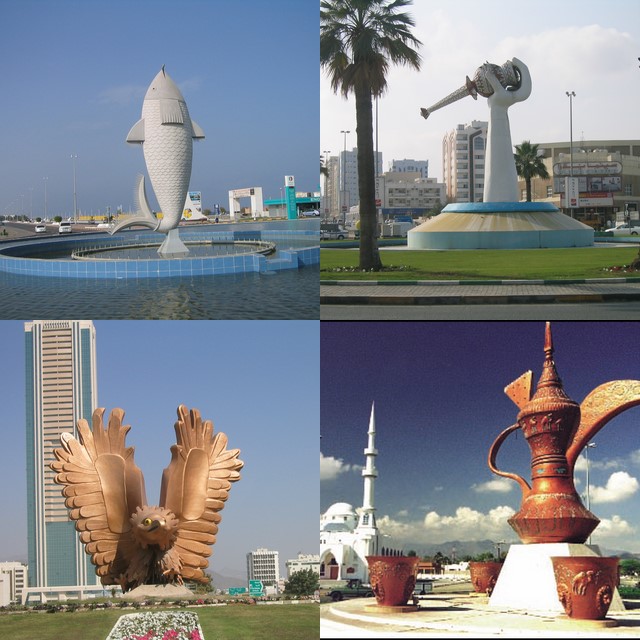 It was noticeably different on our walk early this morning to hear only one voice emanating from the mosques in Fujairah. The volume was loud and the caller was skilful.
It was noticeably different on our walk early this morning to hear only one voice emanating from the mosques in Fujairah. The volume was loud and the caller was skilful.A report in today’s Gulf News (27 February 2008) entitled, ‘Fujairah Introduces Unified Call to Prayer’, indicated the news and supplied the explanations:
“Religious authorities in Fujairah have introduced a unified call to prayer [adhan] on Tuesday, meaning the call will go out at the same time, sounded by a single caller.”
“The system, similar to that already in use in Abu Dhabi, relies on a singular live rendition of the adhan and not a pre-recorded sound-clip.”
“Some 320 mosques in Fujairah and surrounding areas have been fitted with dish receivers to catch the adhan signal beamed via a satellite…”
“Rashid Obaid Al Danhani, Director of the council said the new system is part of the policy of updating all mosques with new technologies.”
Improvement?
This move is certainly new, it marks an update in method and it involves the use of technology but does this mean it is a good move? Just because it is modelled in the capital does not make it right for Fujairah.
Reasons to Bring Back the Muezzins
1. The adhan (ذَان) recited by a live muezzin has been a tradition practiced for centuries and has not only religious significance but important cultural value for this nation.
This was the feature that struck Wilfred Thesiger, the explorer of the Arabian deserts in the 1940s when his Bedu friends emerged from their tents each morning:
“They… were lined up praying, their shadows long upon the desert floor. I was watching them and thinking how this ritual must have remained unchanged in every detail since it was first prescribed by Muhammed…” Wilfred Thesiger, Arabian Sands, 67.)
Now this technological innovation has broken this ancient tradition by diminishing considerably the human factor.
2. What a difference to be woken by an unknown voice relayed by satellite (at least this is better than a pre-recorded sound-clip). What a different effect this will have when Fujairah Muslims are lying in bed and they hear the words beamed by satellite: “Prayer is better than sleep…Make haste towards prayer.” There might now be an un-hasty response that is different from when you knew personally the caller who had already awoken and was at your mosque waiting for you to join him with your company and devotion.
3. The technological innovation reduces the personal factor. If company and fellowship were insignificant the imams would be broadcasting the adhan by television and radio and encouraging people to pray alone in the privacy of their own homes. In a world that is becoming increasingly impersonal it is imperative that religions give a lead and highlight for people the importance of the human factor.
4. The Gulf News reports that 320 mosques in Fujairah have gone high-tech. This means that 319 Fujairah muezzins (and their substitutes—650+) are out of a job. If participation and the exercise of gifts are integral to religious faith and practice then this is a major loss. The unique and sacred task of calling people to prayer will be lost within a generation as young devotees go untrained in this ancient art. One can imagine in a couple of decades a thunderstorm and lightning hitting Fujairah, disabling the satellite system and this being followed by a silence, as there is no one who is able and practiced in calling people to prayer.
5. The technological innovation has been introduced on the basis that ‘a unified call to prayer’ is superior to the traditional method of many voices not in unison. Certainly if this morning’s muezzin is anything to go by the call to prayer will be relayed with power, musicality and confidence. But the disparate voices that I have heard every morning emanating from the nine mosques around our street has been testimony to the diversity in Islam and the truth that while there is a universal call, religious expression can take on a local colour. The homogenization of religion is a retrograde step and it represents the insidious influence of globalization.
6. This franchise approach to religion or what has been called McDonaldization may make mosques more efficient and ensure an even quality every time a call to prayer is sounded. But the cacophony will be missed. The caller who sings out of tune, the singer who sounds like he is gargling and the muezzin who calls up and down like a xylophone all express something fundamental about worship and all of life—the preparedness to offer one’s best to God regardless of whether or not the standard of excellence is attained.
Dr. Geoff Pound
Image: “Make haste towards prayer.”




1 comment:
Soon they will get rid of the Imams too, instead we will have tv screens inside mosques which will lead the prayers !!
Post a Comment